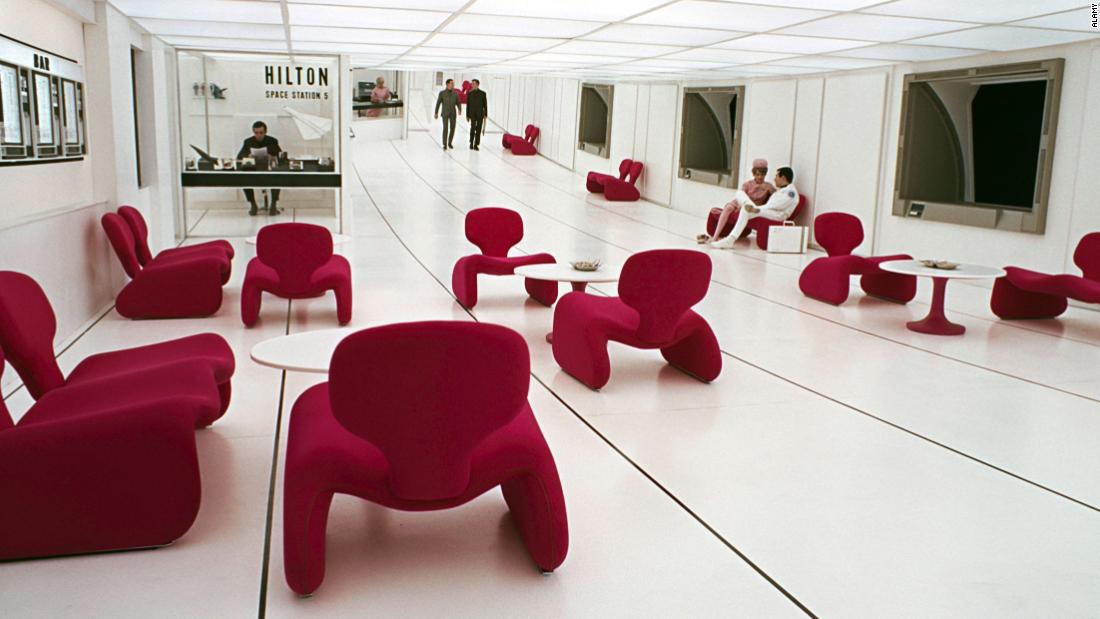(CNN) — Two years before Neil Armstrong set foot on the moon, the Hilton chain of hotels was already planning to welcome guests in space.
Hilton, who was then the president of the family business, proceeded to lay out a detailed plan that included both orbiting and lunar hotels. “By 1967, we’d only been doing jet travel for less than 10 years, so this was really a far-reaching concept,” says Mark E. Young, a hospitality industry historian at the University of Houston.
“But it got a lot of attention: It was in newspapers for the next several days, and not only in the US but around the world. People wrote letters asking to sign reservations. In some ways it was Barron’s greatest PR coup.”
Orbital capsule

The hotel’s reception would be on the Moon’s surface, with rooms beneath.
University of Houston Hilton Archives
Barron Hilton was an aviation enthusiast who could fly airplanes, gliders, helicopters and hot air balloons. He organized flying competitions and get-togethers with pilots and astronauts at his “Flying M” ranch in Nevada, which included an airfield.
He has a gallery named after him at the Smithsonian National Air & Space Museum. Space was his next frontier: “I firmly believe that we are going to have Hiltons in outer space, perhaps even soon enough for me to officiate at the formal opening of the first,” he told attendees in Dallas.
He died in 2019 and never saw his dream realized, but with space tourism potentially just around the corner and commercial space stations not too far away, an actual space hotel doesn’t sound too farfetched anymore.
First on his road map was the Orbiter Hilton, a sort of space laboratory whose 14 levels were designed to accommodate up to 24 people. It was intended for “short trips in space,” such as stopovers on a journey to the moon or another planet, and would welcome guests arriving in “a six-man ferrycraft,” Hilton explained.
Lunar hotel

The hotel was designed with a bar where guests could order cocktails.
University of Houston Hilton Archives
Once the orbital capsules were established, Hilton’s next step was to build a fully fledged underground hotel on the moon, the Lunar Hilton.
The entrance would have been at surface level, with the rest of the structure 20 to 30 feet underground, to keep a constant temperature more easily — surface temperature on the moon can vary from a scalding 260 F (127 C) to a freezing -280 F (-173 C).
The Lunar Hilton was designed with three levels: a mechanical one at the bottom for all the equipment and engineering; a middle one with two 400-foot corridors containing 100 guest rooms; and a top one for public space, including a cocktail lounge.
“The bartenders will have an easy job,” Hilton said. “They will push a button and out will come a pre-measured, pre-cooled mixture of pure ethyl alcohol and distilled water. Into the mixture the bartender drops a tablet — martini, Manhattan, scotch, gin — you name it. Instant drink!”
Cooking, rather worryingly, would be done in a “nuclear-reactor kitchen, mostly by machines.”
The rooms would look remarkably like those on regular Hiltons.
“They wanted to retain as much of the feel of a hotel room on Earth as they could, within the limitations of space technology — which is kind of interesting, I think, because if you’re an astronaut, that’s probably the last thing you’re worried about,” said Young.
The key

Key to the Moon: As a gimmick, Hilton had a key made for its Lunar hotel.
University of Houston Hilton Archives
To better sell the idea, Hilton consulted with Don Douglas, then chairman of the McDonnell Douglas aircraft manufacturer, with a feasibility study done by students at Cornell University, who came complete with some interesting sketches and props.
Among them is a mockup of a room reservation, which hilariously mandates “After 1980” as the arrival date, as well as an imaginary key to one of the rooms. “I love that, because they were trying to imagine what the key of the future would look like in 1967,” says Young.
“So they came up with a sleek-looking key, but what we’ve actually been using as hotel keys for the last 25 years or so — the key card — was really beyond their comprehension.”
There were other things beyond comprehension at the time, as Hilton made clear: “Water, oxygen, weightlessness — such problems are being studied. If they cannot be solved, we cannot have a space Hilton,” he said. In 1968, a year later, the idea was brought to life with even more visual flair in Stanley Kubrick’s masterpiece “2001: A Space Odyssey,” which included a scene in the lounge area of a Hilton space hotel.
But was Hilton truly convinced he could build an orbiting hotel in his lifetime? “I think it was three-quarters fun, but one quarter serious,” says Young. “We hadn’t even landed on the moon yet, but if NASA was ever to be serious about putting a hotel up there or something like that, Hilton wanted to be first in line.”
